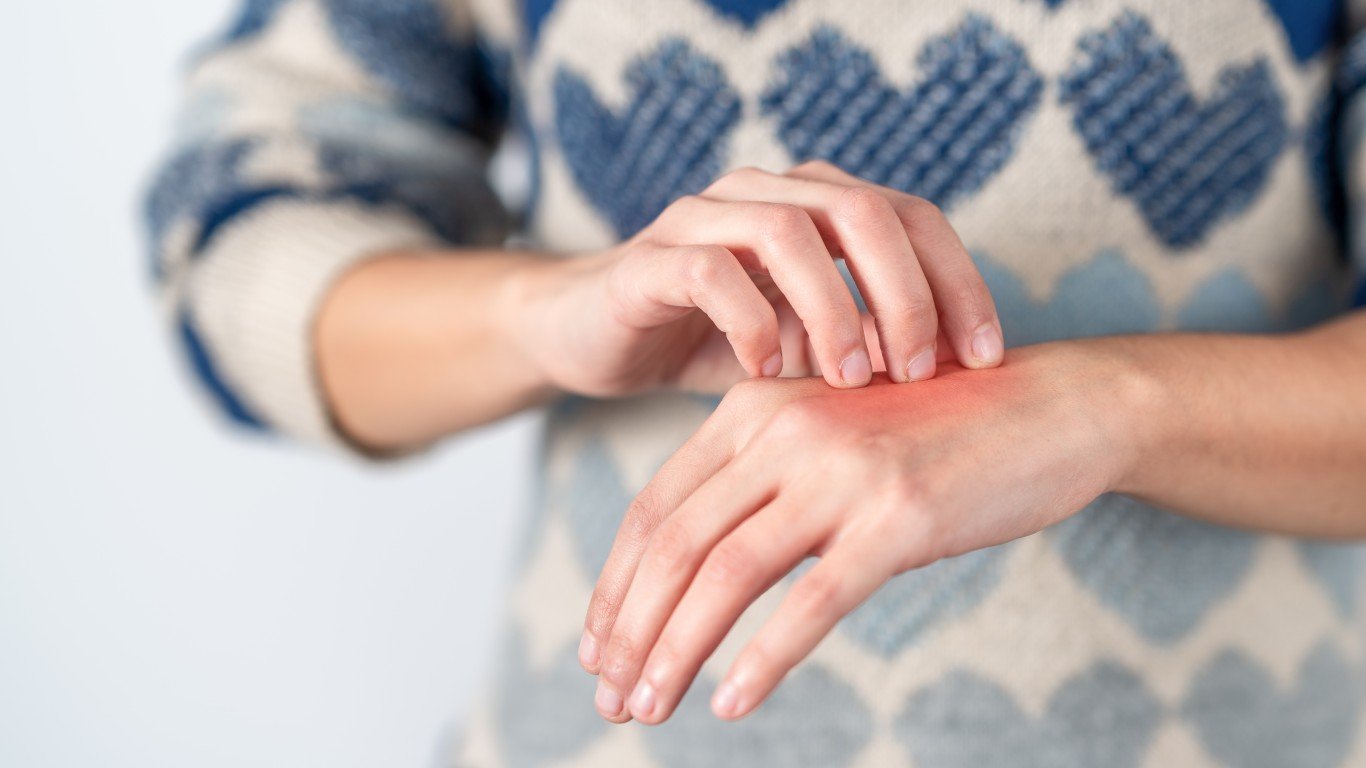You know you have to rush to the ER and call your doctor right away when your chest hurts and you can’t breathe. These are signs you can’t ignore. But some insignificant symptoms that many would dismiss as the result of too much stress are in fact a way for your body to tell you to check your health.
To create a list of 19 habits that may be masking an underlying health problem, 24/7 Tempo consulted doctors and reviewed scores of research papers and academic studies.
Some diseases people have for some time — completely unaware — and it would be good to pay better attention to potential symptoms. Most of us consider our habits as simply that — habits, sometimes bad. While most people grow out of different habits, not all do — and that could be a sign. Overlooking our habits might allow a disease or condition to go undetected.
You can sometimes smell if you’re ill. Many diseases have a particular odor. Diabetes, for example, can make your urine smell like a sweet fruit. One woman can even smell Parkinson’s. But not everyone has such a unique ability. Most people have to rely on what they know about what’s normal behavior. Sometimes, however, even so-called normal behavior can wreak havoc on our bodies — these are 21 “harmless” habits that are actually aging you faster than you can imagine.
Many people already know that getting cravings even when they’re already full is a sign of junk food overconsumption, but an increased appetite when you just ate can also indicate diabetes. Some habits are hard to recognize as being a sign of a potential health problem, especially if they have been part of your daily routine for years. But it never hurts to pay closer attention.
Here are 19 common habits that may be a sign for a serious health problem
You stay up all night: Job burnout

Even though burnout is a well-known phenomenon. It was officially classified as a medical diagnosis by the World Health Organization in May 2019. Burnout, first described in 1974 by psychologist Herbert Freudenberger, is the feeling of chronic work-related stress that has not been managed. Lack of sleep is just one common symptom of the many associated outcomes. Others include exhaustion, lack of motivation, forgetfulness, and pessimism.
You spend a lot of money: Bipolar disorder

Impulsive overspending has been linked to bipolar disorder. If handling money well — including spending within your means and making thoughtful decisions about purchases — is a challenge, spending habits during manic episodes could be part of the explanation.
People affected by manic spending episodes have been known to spend thousands of dollars on art or tattoos or trips. They often feel overconfidence, which leads to the brain basically silencing one’s voice of caution.
You bite your nails: Depression or OCD

Nail biting, or onychophagia, is associated with anxiety and stress. The mere act of chewing on the cuticle, soft tissue surrounding the nail, and the nail itself, which, for most people, typically begins in childhood, relieves tension. This bad habit, for which there is no clear or definitive solution, can be masking a mental health problem, such as depression. Medical reviews suggest that 80% of children and more than 50% of parents who bite their nails have a form of a psychiatric disorder, mainly depression. In 2013, the American Psychiatric Association included severe nail biting in its Diagnostic and Statistical Manual as an obsessive compulsive-related condition. A study found that approximately 11% of children and adolescents who bite their nails frequently were also diagnosed with OCD.
You drink a lot of coffee in the afternoon: Thyroid dysfunction

If people need a lot of coffee later in the day, they may have an underlying hormonal issue caused by a dysfunctional thyroid gland. A major sign that the tiny but powerful butterfly-like gland at the base of the neck doesn’t produce enough of the hormones that control how the body uses energy is chronic fatigue.
And what do most people do when they feel tired but it’s not bedtime yet? They drink coffee. Alas, caffeine, although a stimulant, inhibits thyroid function, according to Alyson Pidich, medical director of the Ash Center — even four hours after consumption.
You wheeze a lot: Reflux disease

You can have acid reflux without the heartburn. Surprising other signs include wheezing. GERD, or gastroesophageal reflux disease, can cause as well as trigger many pulmonary conditions. The irritation of the esophagus can lead to symptoms ranging from abdominal pain to wheezing.
Wheezing, which is breathing with a rattling sound in the chest due to obstruction in the air passages, occurs in patients with GERD because stomach acid gas creeps up into the esophagus and enters the lungs, causing swelling of the airways.
You scratch your skin a lot: Celiac disease

Celiac disease is the body’s immune reaction to eating gluten, a protein found in wheat, barley, and rye. Itchy skin and a blistery rash, which may resemble eczema, are common signs of the condition. It happens because the immune system attacks the skin as a result of gluten ingestion. A person may sometimes first feel burning around the elbows, knees, scalp, buttocks, and back. “Gluten rash,” or dermatitis herpetiformis, often first occurs in adolescence and is more common among men. The only known long-term treatment is a gluten-free diet.
You change your handwriting: Parkinson’s

Parkinson’s is a nervous system disease that affects movement and often includes tremors. People can also notice a change in their handwriting, specifically micrographia. Words become smaller and more cramped together because of the muscle stiffness in the hands and fingers. Micrographia is present in approximately half of patients. In Parkinson’s patients, neurons, which produce dopamine, gradually die. With no or low levels of dopamine, a neurotransmitter that acts as the brain’s messenger to other nerve cells, no messages are being sent to the muscles telling them to move. This can lead to stiffness and changes in handwriting.
You experience road rage: Severe depression

Outbursts of anger and episodes of road rage can mean a lot more than a momentary lapse in judgement. A study of more than 530 patients diagnosed with unipolar major depression found that 54% experienced incidents of overt irritability and anger. They also showed worse impulse control. Such episodes are a sign of more severe and chronic depressive illness. Women are about twice as likely as men to be diagnosed with depression, but men report higher rates of anger attacks, according to separate research. One possible explanation is that admission of emotional weakness in men is seen as socially unacceptable.
You snore: Heart disease

Snoring is a common sign of sleep apnea, a disorder in which breathing often stops during sleep. Its connection to heart disease is still disputed, but there is plenty of research supporting the theory. A 2013 study found that snoring can cause thickening and abnormalities in the carotid artery, a major blood vessel in the neck supplying blood to the brain, neck, and face.
Snoring may even present a bigger risk than being overweight, smoking, and high cholesterol for thickening or abnormalities in the carotid artery. Separate research shows snoring has been linked to cardiovascular diseases such as stroke, hypertension, and heart attack.
You eat but you’re always hungry: Diabetes

To get the energy you need, the body converts food into glucose. Different body cells then use insulin, a hormone, to convert the glucose to energy. Depending on the type of diabetes, your body may not produce enough insulin or the cells may not use it well. Either way, the result is an accumulation of glucose in the bloodstream as less glucose is converted to energy. The decrease in energy, which makes you feel more tired than usual, tends to cause hunger. However, eating doesn’t solve the problem, because no matter how much you eat, the glucose doesn’t get converted and you only end up with even higher blood sugar levels.
Exercise three times a day, every day: Addiction

Going for an hour-long run at 4 a.m., taking Zumba classes in your lunch break, and doing weight lifting at the gym before you get home is not a healthy fitness approach. Aside from the physical damage — such a routine can leave you chronically tired and susceptible to injuries due to the lack of recovery time — a mental health problem may be hiding.
If skipping any of these is stressful to you and interferes with your everyday functioning, it may qualify as an addiction. It is common among triathletes, runners, and people with eating disorders.
You put on five sweatshirts when it’s warm: Thyroid problems

Thyroid problems can confuse your internal thermostat. An underactive thyroid could result in feeling chills all the time because you have less energy available for body cells to use. On the other hand, an overactive thyroid puts energy producing cells into overdrive, making you sweat. Thyroid produces hormones that regulate thermogenesis, also called heat production, acting both in peripheral and central organs. They influence how much blood vessels dilate, affecting how much heat leaves the body.
You always talk about food: Eating disorder

People with eating disorders are often preoccupied with food, especially number of calories, and the amount of carbs and fat in what they are consuming. Being so preoccupied, it often manifests itself in conversations. Engaging in conversations about weight and calories, feeling guilty and being shameful about eating habits, and complaining about being fat, especially if this wasn’t a normal behavior before, are other signs.
You eat very little but feel very full: Stomach cancer

Stomach cancer can make people feel really “full,” especially in the upper abdomen, even after just a few bites. Vomiting solid food a few minutes after eating — with or without blood — is another sign. These symptoms can easily be caused by something else. However, you should be aware of them because many signs don’t appear until the cancer is advanced. Only one in five stomach cancers in the country is found at an early stage.
You are on your phone too much: Anxiety

About a fifth of people with social media accounts cannot go more than three hours without checking them, according to the Anxiety and Depression Association of America. Snapchat, Facebook, Twitter, and Instagram have led to increased feelings of depression, anxiety, poor body image, and loneliness among young adults ages 14 to 24, according to a survey conducted by the Royal Society for Public Health in the U.K. In addition to anxiety, research has found that using social media too much can also cause depression, attention deficit hyperactivity disorder (ADHD), paranoia, and loneliness.
You wake up a lot: Sleep apnea

Experiencing persistent problems falling and staying asleep may be a sign of an underlying sleep disorder such as sleep apnea, which is distinguished by breathing pauses, usually lasting around 10 seconds, during sleep. (The resulting increase of carbon dioxide is what causes you to wake up, and the cycle repeats itself throughout the night.) Inconsistent sleep and low blood oxygen levels as a result of the pauses in breathing can lead to chronic fatigue, hypertension, heart disease, anxiety, and memory problems.
Hitting things when you’re upset: Huntington’s

Huntington’s disease is a genetic condition in which nerve cells in the brain break down over time. It slowly destroys a person’s physical and mental abilities. An inability to control emotions and becoming aggressive is one sign of the disease as the caudate nucleus cells in the brain, which is involved in regulating emotions, deteriorate. The brain then can’t control the intensity of emotions, resulting in possible fits of anger over hunger or changes in routine.
You worry too much: Generalized anxiety disorder

This is more than just being nervous about an upcoming test. This is about worrying constantly about little things — would you know if you worry too much? Generalized anxiety disorder is an ongoing anxiety that interferes with daily activities, such as being unable to focus, feeling tired all the time, having headaches, and sweating a lot. Adults with the condition worry mostly about their jobs, health, and finances. Antidepressants and anti-anxiety medication have been found to be effective in treating the disorder.
You repeat small daily rituals: OCD

Making the bed in the morning, locking the front door, checking to make sure the oven is off are normal daily rituals for many people. But when these daily rituals take over in a way that changes one’s pace for the day, that may be a sign of obsessive compulsive disorder (OCD). Instead of locking the door once you lock it 10 times and keep checking if it’s locked, or you might pass through a door multiple times until it feels right. People with OCD feel a need to perform small rituals to relieve anxiety or tension throughout the body.
